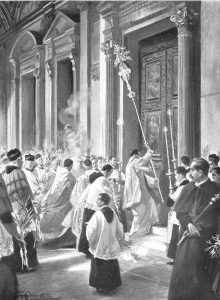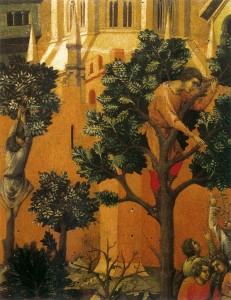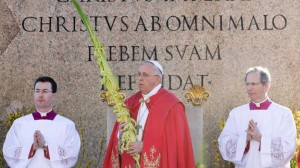Pope Benedict XVI celebrating Palm Sunday with Archbishop Georg Gänswein and one of Memores Domini (March 28, 2021).
Blessed Holy Week
Pope Benedict XVI celebrating Palm Sunday with Archbishop Georg Gänswein and one of Memores Domini (March 28, 2021).
Blessed Holy Week
“May Palm Sunday be a day of decision for you, the decision to say yes to the Lord and to follow him all the way, the decision to make his Passover, his death and resurrection, the very focus of your Christian lives. It is the decision that leads to true joy “Rejoice in the Lord always” (Phil 4:4). So it was for Saint Clare of Assisi when, on Palm Sunday 800 years ago, inspired by the example of Saint Francis and his first companions, she left her father’s house to consecrate herself totally to the Lord. She was eighteen years old and she had the courage of faith and love to decide for Christ, finding in him true joy and peace.”
Pope Benedict XVI, Palm Sunday 2012
 In the ancient form of the Holy Week rites (i.e., prior to the Holy Week reforms of Pius XII in the early 1950’s) there is a very brief yet beautiful ceremony that occurs on Palm Sunday when the procession goes outside the church, the doors to the church are closed. The door of the church is then knocked on three times with the shaft of the processional cross. Having served the Mass, I can say it is a powerful and moving rite of which Benedict XVI spoke:
In the ancient form of the Holy Week rites (i.e., prior to the Holy Week reforms of Pius XII in the early 1950’s) there is a very brief yet beautiful ceremony that occurs on Palm Sunday when the procession goes outside the church, the doors to the church are closed. The door of the church is then knocked on three times with the shaft of the processional cross. Having served the Mass, I can say it is a powerful and moving rite of which Benedict XVI spoke:
“In the old liturgy for Palm Sunday, the priest, arriving in front of the church, would knock loudly with the shaft of the processional cross on the door that was still closed; thereupon, it would be opened. This was a beautiful image of the mystery of Jesus Christ himself who, with the wood of his Cross, with the power of his love that is given, knocked from the side of the world at God’s door; on the side of a world that was not able to find access to God. With his Cross, Jesus opened God’s door, the door between God and men. Now it is open.”
Homily of Pope Benedict XVI
Palm Sunday, 2007
Blessed Holy Week — a week of great and divine drama!
“Let us confidently acknowledge and openly proclaim that Christ was crucified for our sake, declaring it with joy and pride, not with fear and shame. In this, the apostle Paul saw reason for boasting. He could have told us many great and holy things about Christ: how as God he shared with his Father the work of creation, and how as man like us he was Lord of the world. But he would not glory in any one of these marvelous things: ‘God forbid that I should boast of anything’, he said, ‘except the cross of our Lord Jesus Christ.’” (St Augustine)
 Pope Benedict said, “Our procession today is meant, then, to be an image of something deeper, to reflect the fact that, together with Jesus, we are setting out on pilgrimage along the high road that leads to the living God. This is the ascent that matters. This is the journey which Jesus invites us to make.”
Pope Benedict said, “Our procession today is meant, then, to be an image of something deeper, to reflect the fact that, together with Jesus, we are setting out on pilgrimage along the high road that leads to the living God. This is the ascent that matters. This is the journey which Jesus invites us to make.”
From whatever our vantage point on the road, be sure to follow the path Christ has given you. You ought not avoid the given-ness of Providence.
 At the heart of this celebration, which seems so festive, are the words we heard in the hymn of the Letter to the Philippians: “He humbled himself” (2:8). Jesus’ humiliation.
At the heart of this celebration, which seems so festive, are the words we heard in the hymn of the Letter to the Philippians: “He humbled himself” (2:8). Jesus’ humiliation.
These words show us God’s way and the way of Christians: it is humility. A way which constantly amazes and disturbs us: we will never get used to a humble God!
Humility is above all God’s way: God humbles himself to walk with his people, to put up with their infidelity. This is clear when we read the Book of Exodus. How humiliating for the Lord to hear all that grumbling, all those complaints against Moses, but ultimately against him, their Father, who brought them out of slavery and was leading them on the journey through the desert to the land of freedom.
This week, Holy Week, which leads us to Easter, we will take this path of Jesus’ own humiliation. Only in this way will this week be “holy” for us too!
We will feel the contempt of the leaders of his people and their attempts to trip him up. We will be there at the betrayal of Judas, one of the Twelve, who will sell him for thirty pieces of silver. We will see the Lord arrested and carried off like a criminal; abandoned by his disciples, dragged before the Sanhedrin, condemned to death, beaten and insulted. We will hear Peter, the “rock” among the disciples, deny him three times. We will hear the shouts of the crowd, egged on by their leaders, who demand that Barabas be freed and Jesus crucified. We will see him mocked by the soldiers, robed in purple and crowned with thorns. And then, as he makes his sorrowful way beneath the cross, we will hear the jeering of the people and their leaders, who scoff at his being King and Son of God.
This is God’s way, the way of humility. It is the way of Jesus; there is no other. And there can be no humility without humiliation.Following this path to the full, the Son of God took on the “form of a slave” (cf. Phil 2:7). In the end, humility means service. It means making room for God by stripping oneself, “emptying oneself,” as Scripture says (v. 7). This is the greatest humiliation of all.
There is another way, however, opposed to the way of Christ. It is worldliness, the way of the world. The world proposes the way of vanity, pride, success… the other way. The Evil One proposed this way to Jesus too, during his forty days in the desert. But Jesus immediately rejected it. With him, we too can overcome this temptation, not only at significant moments, but in daily life as well.
In this, we are helped and comforted by the example of so many men and women who, in silence and hiddenness, sacrifice themselves daily to serve others: a sick relative, an elderly person living alone, a disabled person…
We think too of the humiliation endured by all those who, for their lives of fidelity to the Gospel, encounter discrimination and pay a personal price. We think too of our brothers and sisters who are persecuted because they are Christians, the martyrs of our own time. They refuse to deny Jesus and they endure insult and injury with dignity. They follow him on his way. We can speak of a “cloud of witnesses” (cf. Heb 12:1).
Let us set about with determination along this same path, with immense love for him, our Lord and Saviour. Love will guide us and give us strength. For where he is, we too shall be (cf. Jn 12:26). Amen.
Bishop Hugh Gilbert, OSB, bishop of Aberdeen, Scotland, tells us about Christ, the donkey and our willingness to become useful for Christ.
Pope Francis’ first celebration of the Holy Week liturgies. His homily for Palm Sunday follows:
1. Jesus enters Jerusalem. The crowd of disciples accompanies him in festive mood, their garments are stretched out before him, there is talk of the miracles he has accomplished, and loud praises are heard: “Blessed is the King who comes in the name of the Lord. Peace in heaven and glory in the highest!” (Lk 19:38).
Crowds, celebrating, praise, blessing, peace: joy fills the air. Jesus has awakened great hopes, especially in the hearts of the simple, the humble, the poor, the forgotten, those who do not matter in the eyes of the world. He understands human sufferings, he has shown the face of God’s mercy, he has bent down to heal body and soul. Now he enters the Holy City! This is Jesus.This is the heart that looks on all of us, watching our illnesses, our sins. The love of Jesus is great. He enters Jerusalem with this love and watches all of us.
It is a beautiful scene, the light of the love of Jesus, that light of his heart, joy, celebration.
We accompany, we follow Jesus, but above all we know that he accompanies us and carries us on his shoulders. This is our joy, this is the hope that we must bring to this world of ours. Let us bring the joy of the faith to everyone! Let us not be robbed of hope! Let us not be robbed of hope! The hope that Jesus gives us!
2. A second word: why does Jesus enter Jerusalem? Or better: how does Jesus enter Jerusalem? The crowds acclaim him as King. And he does not deny it, he does not tell them to be silent (cf. Lk 19:39-40). But what kind of a King is Jesus? Let us take a look at him: he is riding on a donkey, he is not accompanied by a court, he is not surrounded by an army as a symbol of power. He is received by humble people, simple folk, who sense that there is more to Jesus, who have the sense of faith that says, “This is the Savior.”
Jesus does not enter the Holy City to receive the honors reserved to earthly kings, to the powerful, to rulers; he enters to be scourged, insulted and abused, as Isaiah foretold in the First Reading (cf. Is 50:6). He enters to receive a crown of thorns, a staff, a purple robe: his kingship becomes an object of derision. He enters to climb Calvary, carrying his burden of wood. And this brings us to the second word: Cross. Jesus enters Jerusalem in order to die on the Cross. And it is here that his kingship shines forth in godly fashion: his royal throne is the wood of the Cross! I think of what Benedict XVI said to the cardinals: “You are princes but of a Crucified King” that is, Christ’s throne. Jesus takes it upon himself..why? Why the Cross? Jesus takes upon himself the evil, the filth, the sin of the world, including our own sin, and he cleanses it, he cleanses it with his blood, with the mercy and the love of God. Let us look around: how many wounds are inflicted upon humanity by evil! Wars, violence, economic conflicts that hit the weakest, greed for money, which no-one can bring with him. My grandmother would say to us children, no shroud has pockets! Greed for money, power, corruption, divisions, crimes against human life and against creation! And – each of us knows well – our personal sins: our failures in love and respect towards God, towards our neighbor and towards the whole of creation. Jesus on the Cross feels the whole weight of the evil, and with the force of God’s love he conquers it, he defeats it with his resurrection. This is the good that Christ brings to all of us from the Cross, his throne. Christ’s Cross embraced with love does not lead to sadness, but to joy! The joy of being saved and doing a little bit what he did that day of his death.
3. Today in this Square, there are many young people: for 28 years Palm Sunday has been World Youth Day! This is our third word: youth! Dear young people, I think of you celebrating around Jesus, waving your olive branches. I think of you crying out his name and expressing your joy at being with him! You have an important part in the celebration of faith! You bring us the joy of faith and you tell us that we must live the faith with a young heart, always, even at the age of seventy or eighty! A young heart! With Christ, the heart never grows old! Yet all of us, all of you know very well that the King whom we follow and who accompanies us is very special: he is a King who loves even to the Cross and who teaches us to serve and to love. And you are not ashamed of his Cross! On the contrary, you embrace it, because you have understood that it is in giving ourselves that we have true joy and that God has conquered evil through love. You carry the pilgrim Cross through all the Continents, along the highways of the world! You carry it in response to Jesus’ call: “Go, make disciples of all nations” (Mt 28:19), which is the theme of World Youth Day this year. You carry it so as to tell everyone that on the Cross Jesus knocked down the wall of enmity that divides people and nations, and he brought reconciliation and peace. Dear friends, I too am setting out on a journey with you, from today, in the footsteps of Blessed John Paul II and Benedict XVI. We are already close to the next stage of this great pilgrimage of Christ’s Cross. I look forward joyfully to next July in Rio de Janeiro! I will see you in that great city in Brazil! Prepare well – prepare spiritually above all – in your communities, so that our gathering in Rio may be a sign of faith for the whole world. Young people need to tell the world: “It is good to follow Jesus, it is good to go with Jesus, the message of Jesus is good, it is good to come out of ourselves, from the edges of existence of the world and to bring Jesus to others!”
Three words: Joy, Cross and Youth.
Let us ask the intercession of the Virgin Mary. She teaches us the joy of meeting Christ, the love with which we must look to the foot of the Cross, the enthusiasm of the young heart with which we must follow him during this Holy Week and throughout our lives. Amen.
In the procession the people meet Jesus with palm branches, in the passion they slap him in the face and strike his head with a rod. In the one they extol him with praises, in the other they heap insults upon him. In the one they compete to lay their clothes in his path, in the other he is stripped of his own clothes. In the one he is welcomed to Jerusalem as just king and savior, in the other he is thrown out of the city as a criminal…If, then, we want to follow our leader without stumbling through prosperity and through adversity, let us keep our eyes upon him, honored in the procession, undergoing ignominy and suffering in the passion, yet unshakably steadfast in all such changes of fortune.
Blessed Guerric of Igny